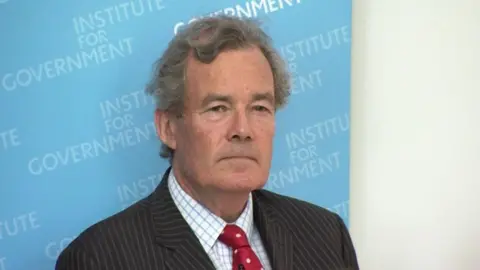High Court to look at PM's Patel 'bullying' decision
 Reuters
ReutersThe High Court has decided to look into Boris Johnson's decision that Home Secretary Priti Patel did not break Whitehall rules over bullying.
The prime minister kept Ms Patel in post last year after he found she had not breached the ministerial code, which sets behavioural standards.
But the FDA senior civil servants' union, which brought the case, argued that Mr Johnson had "erred".
The court will now give a full hearing into its claims against him.
The government opposed taking the case forward in this way, saying the ministerial code was separate from the law and should remain so.
In November, an inquiry carried out by the prime minister's head of standards, Sir Alex Allan, found that Ms Patel had "unintentionally" broken the ministerial code.
Her approach to staff had "on occasions... amounted to behaviour that can be described as bullying in terms of the impact felt" by individuals, it added.
But it said the home secretary - who offered a "fulsome apology" - had sometimes "legitimately... not always felt supported" by others within the Home Office.

This decision is a really big deal.
Ministers are appointed in the name of the monarch - and can be sacked on a prime ministerial whim.
The civil servants who work under them are however hired under normal employment law - with all the protections against bad treatment that come with it.
The ministerial code, which Priti Patel was accused of breaking, is therefore somewhere in between a workplace policy booklet and a set of political aspirations for good governance.
The FDA's argument is that the elements of the code on bullying - and a judgement on whether someone has been victimised - must be open to scrutiny under employment law.
Why does this matter?
Well, if the FDA wins the case, it would be an absolute first.
Some of the prime minister's conduct may be open to scrutiny under employment law, as if he were any other kind of boss.
And that would probably be a massive constitutional question for the Supreme Court which could be asked to redefine the boundary between politics and the law.

It is the prime minister's job to decide, ultimately, whether there has been a breach of the ministerial code - and Mr Johnson said he did not think Ms Patel had been guilty of one.
Choosing to keep her in post, he said she was not a "bully" and there had been "mitigating" circumstances behind her behaviour.
The inquiry's author - the prime minister's standards adviser, Sir Alex Allan - resigned following the decision and has not yet been replaced.

In the High Court, the FDA accused the government of using a "ragbag of arguments" to suggest Mr Johnson's decision should not go to a full review, rather than "identifying any clear rule or principle".
It added that there has been a "misunderstanding" of the term "bullying" by Mr Johnson.
After the judgement, FDA general secretary Dave Penman said he was "very pleased", adding: "The ministerial code is the only means by which civil servants can raise complaints against the conduct of ministers and it is vital that decisions on this are subject to the rule of law."
The government said it was unable to comment on an ongoing case.
The prime minister has previously said that he has full confidence in Ms Patel and considers the matter closed.

What is the ministerial code?
- Government document setting out "expected standards" of behaviour in office, including "consideration and respect" for civil servants and other colleagues
- Ministers are normally expected to resign if they are found to have broken the code
- Ministers who have stepped down include Liam Fox, over taking a friend and lobbyist on official trips, and Mark Field, who grabbed a climate protester
- The code has existed since the Second World War but was not made public until 1992

